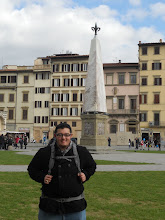A couple of weeks ago myself and the other Rhode Island deputies to the 2009 General Convention, gathered to discuss the proposed covenant for the Anglican Communion. Following our meeting the conversation was summarized in a letter, which we sent to the Bishop as she prepares to head to Lambeth. Our letter is copied below.
Dear Bishop Wolf,
On June 12, the Deputies from Rhode Island gathered to discuss the St. Andrew's Draft of the proposed Covenant. In keeping with the suggestion of President Bonnie Anderson, we would like to share with you some of our discussion as you head to the Lambeth Conference.
We engaged in an hour-long discussion, and it was clear that while we are not in complete agreement, we are of a common mind on some aspects of the proposed Covenant. We did not take formal votes, and this letter is meant to give you a sense of our conversation, as we all continue to discern where God might be calling the church.
We began with a discussion of whether or not it even makes sense to ratify a Covenant, given our identity as Anglican Christians. Our shared opinion was that this would be a significant departure from our heritage. For over 15 centuries, the Church has been guided by the historic creeds. Since the Reformation, Anglicans have been united by a common liturgical expression. And in more recent times, the modern Anglican Communion has found common expression in the Chicago-Lambeth Quadrilateral. We do not believe that a Covenant will add usefully to these existing expressions.
We agreed that we are not a confessional church. Though the 39 Articles bear some aspects of confession, they have never been accorded a place of primacy in this country, nor in most of the Anglican Communion. Even in England, subscription to them is no longer required. More to the point, the Anglican Communion has never been understood as a confessional church.
Generally speaking, then, we believe that the adoption of a Covenant represents an unwelcome change to our identity as Anglican Christians. Even if it were felt that such a document is required, due to changing circumstances, we agreed that now is not the time to adopt a Covenant.
We acknowledge that we are in crisis now, and believe that it is important to move through the crisis first -- before we adopt a Covenant. It would be too important to risk having its adoption driven by a hasty response to a particular crisis. We are also concerned about the process for developing this Covenant. Not all voices have been represented in its creation, which notably lacks GLBT Anglican voices and the voices of women. We wonder if an unjust process can lead to a just document."
With that said, we moved to a discussion of the Covenant itself. Our reading of the present situation is that some kind of document is likely to be circulated to the Provinces of the Communion for adoption. So while we believe this may be an error, we wanted to comment on the text before us.
We had no significant issue with the first two sections, in which the frameworks for agreement are laid out. In fact, if this were adopted, most of us would have no significant objection. Several of us found minor points objectionable, but we could live with those two sections.
The third section was more problematic. Most of us felt that it is inappropriate to create a mechanism for the expulsion of Provinces, especially in the current situation. Most troubling to us, we wish express our strenuous objection to the elevation to curial authority of the Instruments of Communion, particularly those populated solely by bishops. This is the wrong time to consider this significant shift in our polity. We are willing to grant the Archbishop of Canterbury a place of primacy as the primus inter pares of Anglican bishops. This position of moral and spiritual authority allows him to speak to the Communion on matters of great concern. We agree that he may wish to consult with his sister and brother bishops in the Lambeth Conferences. We understand that these bishops may practice their episcopal charism together, as a group. We support the Archbishop of Canterbury in summoning the Primates for mutual support and conversation. We strongly object to either the Primates or the Lambeth Conferences speaking for the entire Communion, made up of laity, bishops, priests, and deacons.
The final section of the Covenant, in which mechanisms for expelling Provinces are spelled out, is obviously problematic for us. We would not wish this to be considered as authoritative.
If there must be a Covenant, we hope it will serve as a means of unity and reconciliation, not of coercion and separation.
Please know that you are in our thoughts and prayers in this important time in the life of our church. We urge you to bear witness to the spiritual vitality of the Episcopal Church, and we look forward to hearing about the faith of our sister and brother Anglicans throughout the world.
Sincerely,
the RI deputies and alternates to the 76th General Convention
Doing the dishes so we can spread the Gospel
1 year ago





